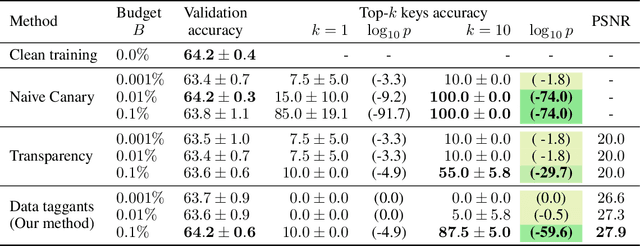Data Taggants: Dataset Ownership Verification via Harmless Targeted Data Poisoning
Paper and Code
Oct 09, 2024



Dataset ownership verification, the process of determining if a dataset is used in a model's training data, is necessary for detecting unauthorized data usage and data contamination. Existing approaches, such as backdoor watermarking, rely on inducing a detectable behavior into the trained model on a part of the data distribution. However, these approaches have limitations, as they can be harmful to the model's performances or require unpractical access to the model's internals. Most importantly, previous approaches lack guarantee against false positives. This paper introduces data taggants, a novel non-backdoor dataset ownership verification technique. Our method uses pairs of out-of-distribution samples and random labels as secret keys, and leverages clean-label targeted data poisoning to subtly alter a dataset, so that models trained on it respond to the key samples with the corresponding key labels. The keys are built as to allow for statistical certificates with black-box access only to the model. We validate our approach through comprehensive and realistic experiments on ImageNet1k using ViT and ResNet models with state-of-the-art training recipes. Our findings demonstrate that data taggants can reliably make models trained on the protected dataset detectable with high confidence, without compromising validation accuracy, and demonstrates superiority over backdoor watermarking. Moreover, our method shows to be stealthy and robust against various defense mechanisms.
 Add to Chrome
Add to Chrome Add to Firefox
Add to Firefox Add to Edge
Add to Edge